Broccoli: Here at healthfulhub.com, we participate in affiliate programs and may earn a commission if you make a purchase, at no additional cost to you. Learn more
Introduction: The Health Benefits of Broccoli
Broccoli is a vegetable celebrated for its nutritional richness and diverse health benefits. It belongs to the cruciferous family, which includes kale, cauliflower, and Brussels sprouts. Consuming broccoli regularly can contribute to a healthier lifestyle and help prevent various diseases. In this article, we will go over the multiple health benefits of broccoli and also provide a few delicious recipes for you and your family.
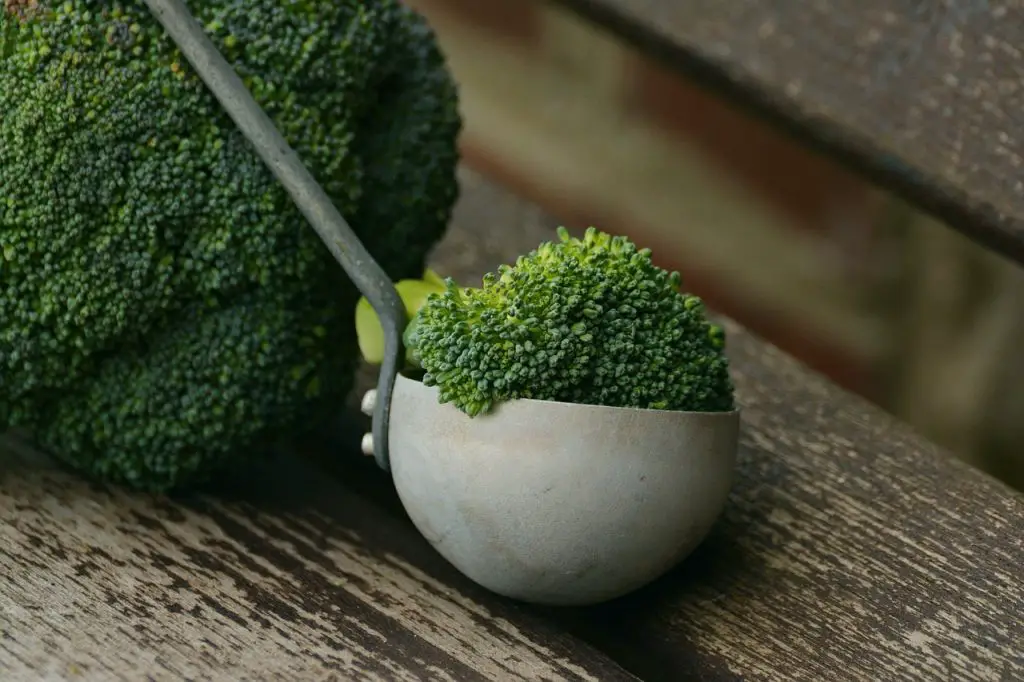
Nutrient-Rich Profile
Broccoli is packed with essential vitamins and minerals. It provides significant amounts of vitamins C, K, and A. Additionally, broccoli contains folate, fiber, and potassium. These nutrients are vital for maintaining overall health and preventing nutrient deficiencies.
Besides vitamins and minerals, broccoli is also high in antioxidants. These compounds help combat oxidative stress and reduce inflammation in the body. The most notable antioxidant in broccoli is sulforaphane1, which has been extensively studied for its health benefits.
Cancer Prevention
One of the most remarkable benefits of broccoli is its potential role in cancer prevention. Sulforaphane, found in high amounts in broccoli, has shown promising results in inhibiting cancer cell growth. Studies suggest that sulforaphane may help reduce the risk of cancers such as breast, prostate, and colon cancer.
Moreover, broccoli contains other compounds like glucosinolates2 and indole-3-carbinol.3 These substances also contribute to its cancer-fighting properties. They work by detoxifying harmful substances and promoting healthy cell function.
Heart Health
Incorporating broccoli into your diet can significantly benefit your heart health. Its high fiber content helps lower cholesterol levels. Fiber binds with cholesterol in the gut, preventing its absorption into the bloodstream. Consequently, this can reduce the risk of heart disease.
Additionally, the potassium in broccoli supports heart health by regulating blood pressure. Potassium helps balance sodium levels in the body, which is crucial for maintaining healthy blood pressure levels. This makes broccoli a heart-friendly vegetable.
Digestive Health
Broccoli is an excellent choice for promoting digestive health. Its fiber content aids in regular bowel movements and prevents constipation. Furthermore, broccoli supports a healthy gut microbiome. The fiber in broccoli serves as food for beneficial gut bacteria, enhancing their growth and activity.
As mentioned earlier, an important component of broccoli is its sulforaphane content. This compound has been shown to protect the lining of the stomach. It may also help prevent the overgrowth of harmful bacteria such as Helicobacter pylori,4 which is linked to stomach ulcers and cancer.
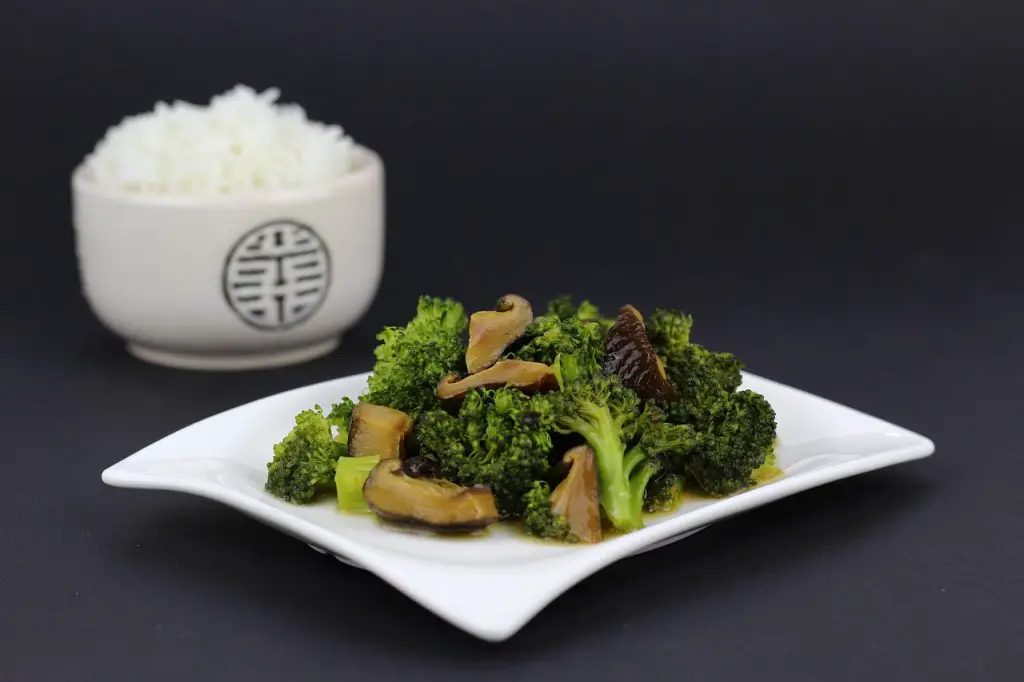
Bone Health
Broccoli contributes to bone health due to its rich vitamin K and calcium content. Vitamin K is essential for bone formation and mineralization. It helps improve bone density and reduces the risk of fractures.
Moreover, calcium is a well-known nutrient for maintaining strong bones and teeth. Broccoli’s high calcium content makes it a beneficial addition to a bone-healthy diet. Regular consumption of broccoli can help prevent osteoporosis and other bone-related disorders.
Immune System Boost
Boosting the immune system is another key benefit of eating broccoli. The high vitamin C content in broccoli plays a crucial role in strengthening the immune system. Vitamin C stimulates the production of white blood cells, which are essential for fighting infections.
In addition to vitamin C, broccoli contains other immune-boosting nutrients. These include beta-carotene, zinc, and selenium. Together, these nutrients enhance the body’s defense mechanisms, making it more resilient to illnesses.
Weight Management
Including broccoli in your diet can aid in weight management. This vegetable is low in calories but high in fiber. Fiber-rich foods help you feel full longer, reducing your overall calorie intake.
Additionally, broccoli has a high water content, which adds volume to meals without adding extra calories. This makes it an ideal food for those looking to lose weight or maintain a healthy weight. Its nutrient density also ensures you get essential vitamins and minerals while controlling your calorie intake.
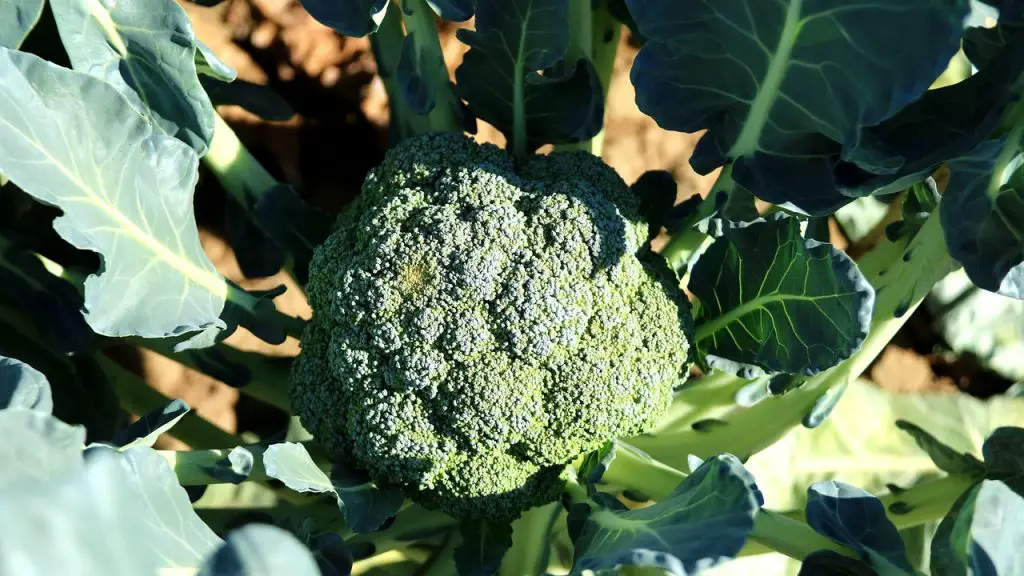
Skin Health
Broccoli can also benefit skin health due to its rich array of nutrients. Vitamin C in broccoli is vital for collagen production, which keeps the skin firm and youthful. Moreover, the antioxidants in broccoli protect your skin from free radicals and UV exposure damage.
Furthermore, sulforaphane has shown potential for protecting the skin from UV radiation damage. This compound helps reduce inflammation and may even have anti-aging effects. Regular consumption of broccoli can contribute to healthier, more resilient skin.
Eye Health
Eating broccoli can improve eye health as well. It contains beta-carotene, lutein, and zeaxanthin, which are essential for maintaining good vision. These compounds protect the eyes from oxidative stress and reduce the risk of age-related eye disorders.
Beta-carotene, in particular, is converted into vitamin A in the body. Vitamin A is crucial for night vision and overall eye health. Thus, including broccoli in your diet can help protect your eyes and maintain good vision.
Anti-Inflammatory Properties
Broccoli possesses potent anti-inflammatory properties, making it an excellent choice for reducing chronic inflammation. Chronic inflammation is linked to numerous diseases, including heart disease, diabetes, and cancer. The sulforaphane in broccoli helps to lower inflammation at the molecular level.
Moreover, broccoli contains omega-3 fatty acids, which are also known for their anti-inflammatory effects. Combined with its rich antioxidant profile, broccoli can significantly reduce inflammation and help manage conditions associated with chronic inflammatory responses.
Detoxification
Broccoli supports the body’s natural detoxification processes. This vegetable is rich in gluconasturtiin,5 and glucobrassicin,6 compounds that aid in detoxification at a cellular level. These compounds activate detoxifying enzymes in the liver, which help remove harmful substances from the body.
Additionally, the high fiber content of broccoli assists in eliminating toxins through the digestive tract. By promoting regular bowel movements, broccoli helps to expel waste and toxins, maintaining a clean and healthy digestive system.
Blood Sugar Control
For individuals managing diabetes or looking to maintain stable blood sugar levels, broccoli is a beneficial addition to the diet. The fiber in broccoli slows down the digestion and absorption of carbohydrates, leading to more gradual increases in blood sugar levels.
Furthermore, research suggests that the sulforaphane in broccoli can improve insulin sensitivity. Enhanced insulin sensitivity helps the body use insulin more effectively, thus lowering blood sugar levels. Including broccoli in meals can help stabilize blood sugar and support overall metabolic health.
Cognitive Function
Broccoli’s benefits extend to brain health as well. The antioxidants and bioactive compounds in broccoli can protect the brain from oxidative damage and support cognitive function. Specifically, sulforaphane has shown potential for reducing the risk of neurodegenerative diseases such as Alzheimer’s and Parkinson’s.
Also, broccoli is a good source of choline,7 a nutrient essential for brain development and function. Choline plays a crucial role in the production of neurotransmitters and the maintenance of cell membranes in the brain. Consuming broccoli regularly can help enhance memory, focus, and overall cognitive performance.
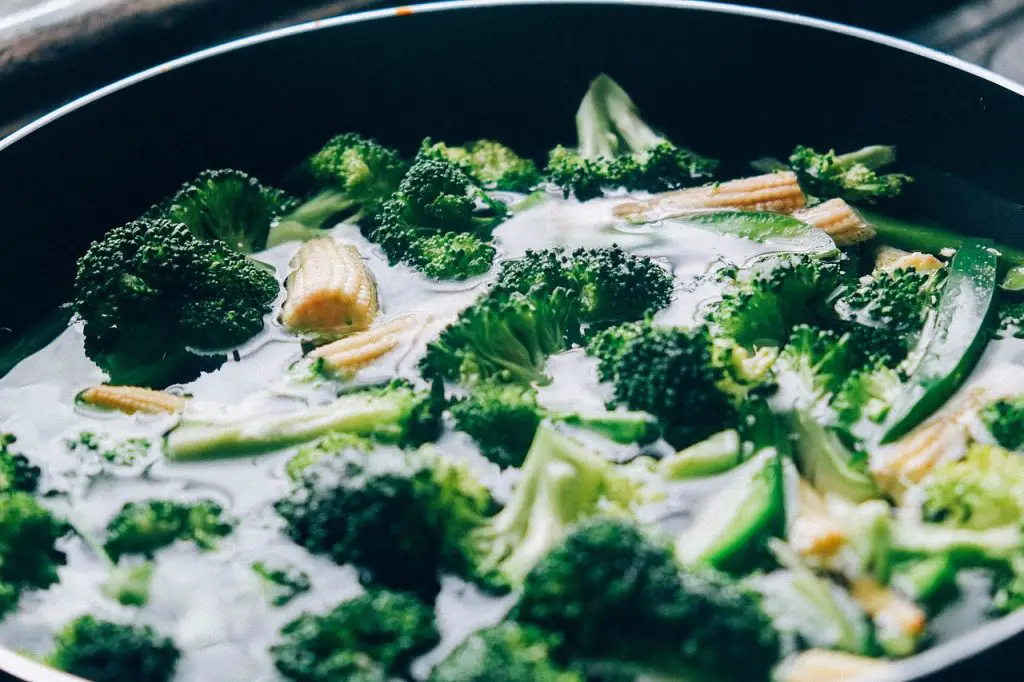
Respiratory Health
Incorporating broccoli into your diet can improve respiratory health. Pollutants and oxidative stress can damage your lungs, but broccoli’s antioxidants and anti-inflammatory compounds protect them. Regular consumption of broccoli can support lung function and reduce the risk of respiratory conditions such as asthma and chronic obstructive pulmonary disease (COPD).8
Additionally, the sulforaphane in broccoli may enhance the body’s natural defense against respiratory infections. This compound helps boost the immune response in the respiratory tract, making it more resilient to bacterial and viral infections.
Skin Repair and Protection
Beyond its benefits for skin health, broccoli also aids in skin repair and protection. The vitamin C and vitamin A in broccoli are essential for the skin’s healing processes. Vitamin C supports the production of collagen, a protein crucial for wound healing and skin repair.
Furthermore, the beta-carotene in broccoli protects the skin from sun damage. Beta-carotene is converted into vitamin A, which helps maintain healthy skin cells and repair damage caused by UV exposure. Consuming broccoli can thus help keep your skin healthy and resilient.
Support During Pregnancy
Broccoli is a highly recommended vegetable for pregnant women. It is rich in essential nutrients such as folate, iron, and calcium, which are vital for the health of both the mother and the developing baby. Folate is crucial for preventing neural tube defects, while iron supports healthy blood cell production.
Moreover, the high calcium content in broccoli helps in the development of the baby’s bones and teeth. Including broccoli in a pregnancy diet can provide essential nutrients needed for a healthy pregnancy and fetal development.
Mood and Mental Health
Broccoli may also positively impact mood and mental health. Its high levels of antioxidants and anti-inflammatory compounds can help reduce symptoms of depression and anxiety. Chronic inflammation and oxidative stress have been linked to mental health disorders, and the nutrients in broccoli can help counteract these effects.
Additionally, the folate in broccoli plays a role in the production of serotonin, a neurotransmitter associated with mood regulation. Consuming broccoli can help support a balanced mood and contribute to overall mental well-being.
Delicious Broccoli Recipes
Broccoli is a versatile and nutritious vegetable that can be incorporated into a variety of dishes. Its rich content of vitamins, minerals, and antioxidants makes it a favorite among health-conscious individuals. Whether you are looking to add more greens to your diet or simply enjoy the unique flavor of broccoli, there are countless ways to prepare it. From simple roasted sides to creamy soups and vibrant stir-fries, broccoli can elevate any meal with its distinctive taste and health benefits.
Below are three delightful broccoli recipes: Garlic Roasted Broccoli, Broccoli Cheddar Soup, and Broccoli Stir-Fry. These recipes are easy to prepare, packed with flavor, and sure to become staples in your culinary repertoire.
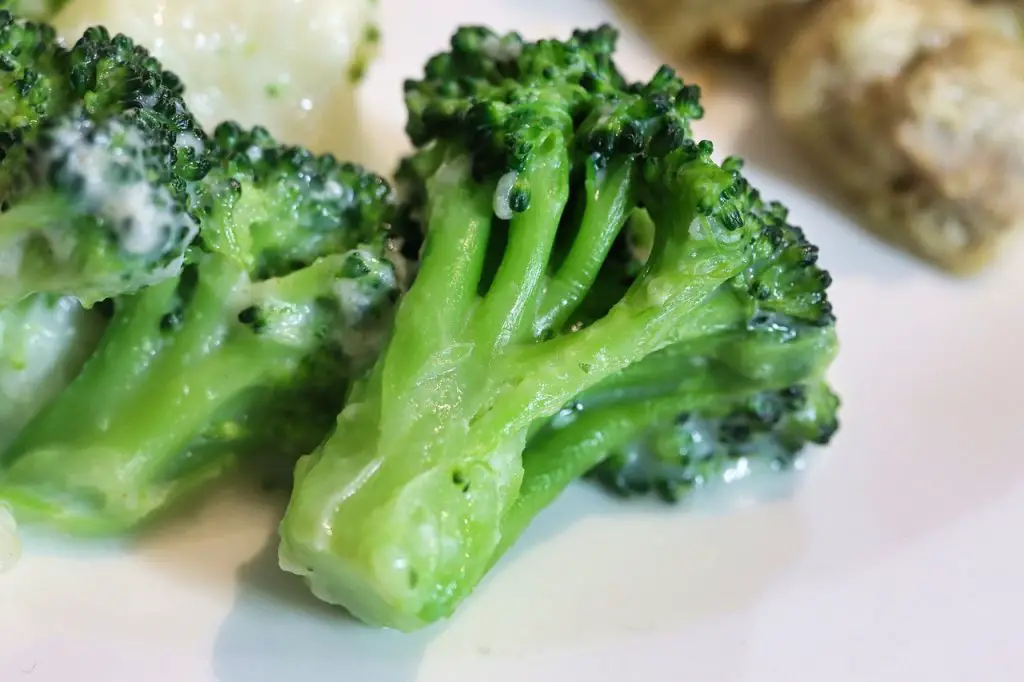
1. Garlic Roasted Broccoli
Ingredients:
- 1 head of broccoli, cut into florets
- 3 tablespoons of olive oil
- 4 garlic cloves, minced
- 1/4 teaspoon salt
- 1/4 teaspoon black pepper
- 1/4 teaspoon red pepper flakes (optional)
- 1/4 cup grated Parmesan cheese (optional)
Instructions:
- Preheat your oven to 425°F (220°C).
- In a large bowl, toss the broccoli florets with olive oil, minced garlic, salt, black pepper, and red pepper flakes.
- Spread the broccoli in a single layer on a baking sheet.
- Roast in the preheated oven for 20–25 minutes, until the edges are crisp and the stems are tender.
- If desired, sprinkle with Parmesan cheese immediately after removing it from the oven.
- Serve hot.

2. Broccoli Cheddar Soup
Ingredients:
- 4 cups of broccoli florets
- 1 small onion, chopped
- 2 garlic cloves, minced
- 4 cups of chicken or vegetable broth
- 1 cup shredded carrots
- 1 cup heavy cream
- 2 cups shredded sharp cheddar cheese
- 3 tablespoons of butter
- 3 tablespoons of all-purpose flour
- Salt and pepper to taste
Instructions:
- In a large pot, melt the butter over medium heat.
- Add the chopped onion and garlic, and cook until softened.
- Sprinkle in the flour, stirring constantly, to make a roux. Cook for about 2 minutes.
- Gradually whisk in the broth, ensuring no lumps form.
- Add the broccoli and shredded carrots. Bring the mixture to a simmer and cook until the broccoli is tender, about 15–20 minutes.
- Use an immersion blender to blend the soup until smooth, or leave it chunky if you prefer.
- Stir in the heavy cream and shredded cheddar cheese until the cheese is melted and the soup is creamy.
- Season with salt and pepper, to taste.
- Serve hot with crusty bread.

3. Broccoli Stir-Fry
Ingredients:
- 4 cups of broccoli florets
- 1 red bell pepper, sliced
- 1 yellow bell pepper, sliced
- 1/2 cup snow peas
- 2 tablespoons of vegetable oil
- 3 garlic cloves, minced
- 1-inch piece of ginger, grated
- 3 tablespoons of soy sauce
- 1 tablespoon oyster sauce
- 1 tablespoon cornstarch mixed with 2 tablespoons water (optional, for thickening)
- 1/4 teaspoon red pepper flakes (optional)
- Cooked rice or noodles for serving
Instructions:
- Heat the vegetable oil in a large skillet or wok over medium-high heat.
- Add the minced garlic and grated ginger, and stir-fry for about 30 seconds, until fragrant.
- Add the broccoli florets, red bell pepper, yellow bell pepper, and snow peas to the skillet.
- Stir-fry the vegetables for about 5-7 minutes, until they are tender-crisp.
- Add the soy sauce and oyster sauce to the skillet, tossing to coat the vegetables.
- If you prefer a thicker sauce, add the cornstarch slurry and cook until the sauce has thickened.
- Sprinkle with red pepper flakes, if desired.
- Serve hot over cooked rice or noodles.
Conclusion: The Health Benefits of Broccoli
Broccoli stands out as a powerhouse of nutrients and health benefits. Its ability to prevent chronic diseases, support various bodily functions, and enhance overall well-being makes it a valuable addition to any diet. Regular consumption of broccoli can lead to significant health improvements and contribute to a long, healthy life.

Michael is a freelance writer. He devotes a great deal of time to reviewing health-related products and is passionate about writing engaging and helpful content. With over twenty years of experience, he writes to help you make well-informed decisions for the health of you and your family.
- There is robust epidemiological evidence for the beneficial effects of broccoli consumption on health, many of them clearly mediated by the isothiocyanate sulforaphane. Present in the plant as its precursor, glucoraphanin, sulforaphane is formed through the actions of myrosinase, a β-thioglucosidase present in either the plant tissue or the mammalian microbiome.
- Glucosinolates are a large group of plant secondary metabolites with nutritional effects and biologically active compounds. Glucosinolates are mainly found in cruciferous plants such as Brassicaceae family, including common edible plants such as broccoli.
- Recent studies on the role of indole-3-carbinol in Arabidopsis open the door for cross-kingdom comparisons that can help in understanding the roles of this important phytohormone in both plant biology and combating cancer.
- Helicobacter pylori (H. pylori) infection occurs when Helicobacter pylori (H. pylori) bacteria infect your stomach. This usually happens during childhood. A common cause of stomach ulcers (peptic ulcers), H. pylori infection may be present in more than half the people in the world.
- Gluconasturtiin or phenethyl glucosinolate, is one of the most widely distributed glucosinolates in cruciferous vegetables, mainly in the roots.
- Glucobrassicin is a type of glucosinolate that can be found in almost all cruciferous plants, such as cabbages, broccoli, mustards, and woad. As for other glucosinolates, degradation by the enzyme myrosinase is expected to produce an isothiocyanate, indol-3-ylmethylisothiocyanate.
- Choline is an essential nutrient that is naturally present in some foods and available as a dietary supplement. Choline is a source of methyl groups needed for many steps in metabolism. The body needs choline to synthesize phosphatidylcholine and sphingomyelin, two major phospholipids vital for cell membranes.
- Chronic obstructive pulmonary disease (COPD) is a common lung disease causing restricted airflow and breathing problems. It is sometimes called emphysema or chronic bronchitis. In people with COPD, the lungs can get damaged or clogged with phlegm.

